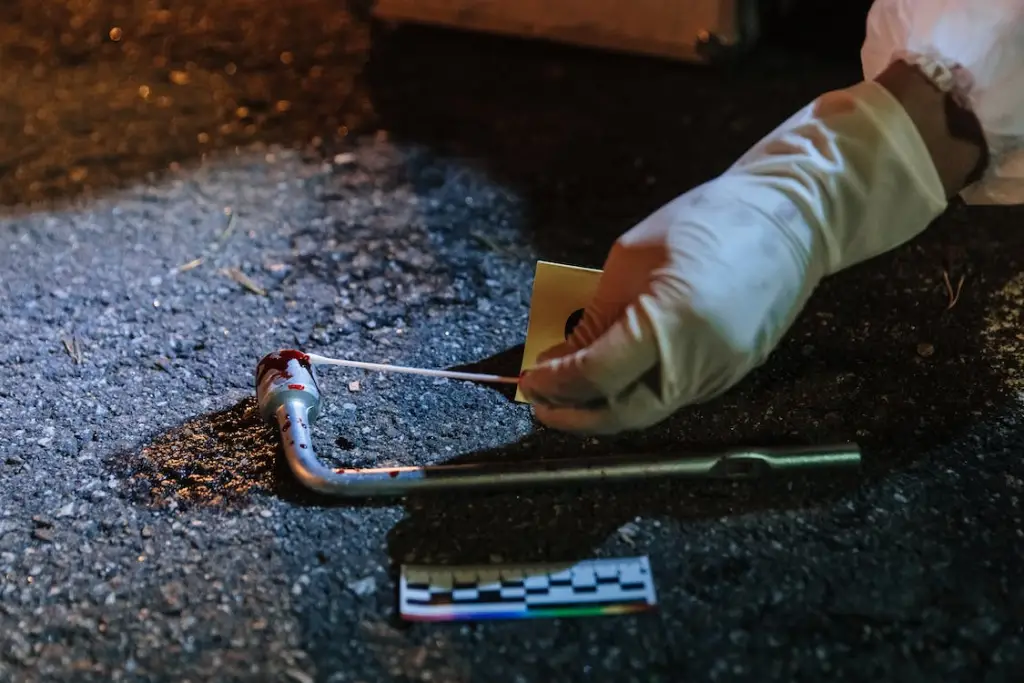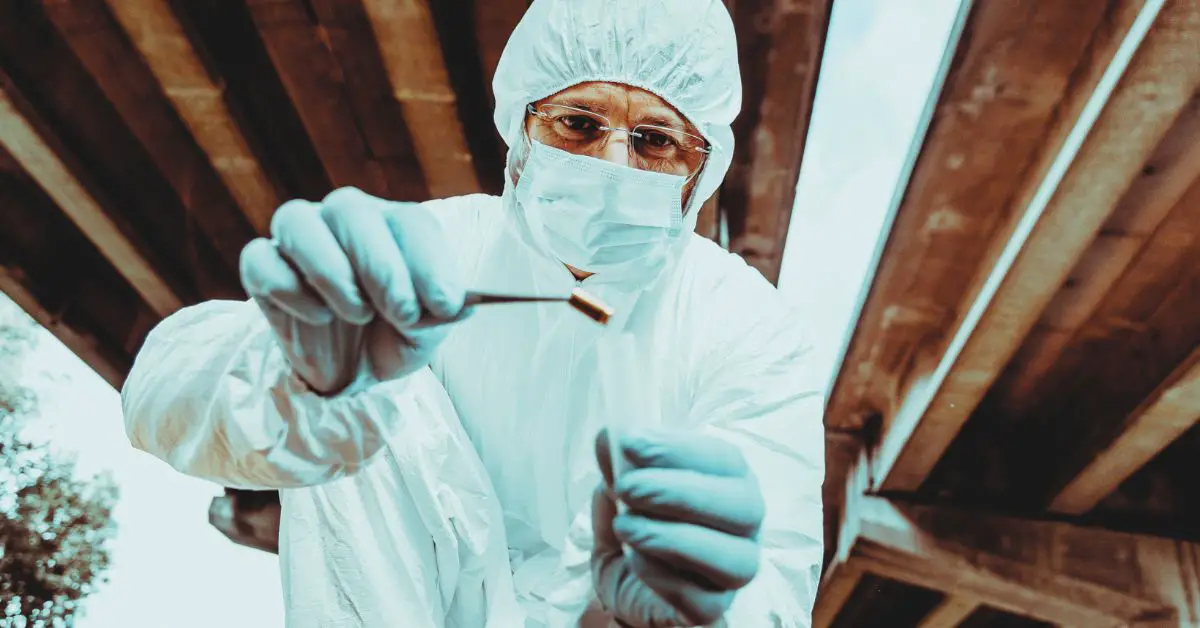We used the latest data and insights to identify the highest paying forensic science jobs so that you can learn and earn more.
Forensic science is a place where you can combine your love of science with your passion for justice and the law. What do you do if you’re interested in this field but you’re not sure how to get started?
In this article, we’ll talk about the highest-paying forensic science jobs so that you can see where your future could take you.
We sourced this information from various sources, including the US Bureau of Labor Statistics, Glassdoor, and PayScale. We also looked at what real forensic scientists had to say about their jobs to get an idea of what they actually do daily.
Let’s dive in!
Here is a video summary based on this article
Similar Articles:
- 10 Highest Paying Geography Jobs to Consider
- 10 Highest Paying Aviation Jobs to Consider
- 10 Highest Paying Insurance Jobs to Consider
Table of Contents
#10. Fingerprint Technician
How much do they get paid?
- Source: Glassdoor
- Low Range: $28,000 per year
- High Range: $53,000 per year
- Median Pay: $38,231 per year

What do they do?
Fingerprint technicians collect and analyze fingerprints at crime scenes, police departments, and other law enforcement agencies. They may also provide fingerprint analysis for criminal investigations.
What degrees and skills are usually required?
This job requires that you have a high school diploma. Fingerprint technicians have some training in fingerprint identification.
Who’s hiring for this job?
Fingerprint technicians work for government agencies, such as the FBI and local police departments. These forensic scientists also work for private companies that provide fingerprint identification services to law enforcement agencies, attorneys, and the courts.
What is the best way to get this job?
If you want to become a fingerprint technician, you will need to go through training and certification. The best way to get started is by enrolling in a certificate program that prepares students for careers in fingerprint identification.
Then, when you are ready to find a job, look for positions with government and law enforcement agencies. Many private companies provide fingerprint identification services.
What is it to be a fingerprint technician?
#9. Evidence Technician
How much do they get paid?
- Source: ZipRecruiter
- Low Range: $11,000 per year
- High Range: $73,000 per year
- Median Pay: $47,205 per year

What do they do?
Evidence technicians collect, preserve, and analyze physical evidence from crime scenes. They work for law enforcement agencies and private companies.
Evidence technicians may be called upon to document the scene of a crime, photograph it, collect fingerprints or DNA samples, process any blood or other bodily fluids found there, and conduct tests on any drugs that have been recovered.
What degrees and skills are usually required?
These professionals typically have a high school diploma, but many have a bachelor’s degree in criminal justice or forensic science. However, employers look for candidates with experience in criminal investigations and a background in law enforcement.
Who’s hiring for this job?
Evidence technicians typically work for local law enforcement agencies and police departments. They may also work for crime laboratories that test evidence collected at crime scenes.
What is the best way to get this job?
The best way to get a job as an evidence technician is to get training from a local police department.
This may include courses in forensic science, crime scene investigation, and evidence collection. You can also earn your bachelor’s degree in criminal justice or forensic science and find work at a crime lab.
What is it like to be an evidence technician?
Similar Articles:
- 10 Highest Paying Jobs For Business Administration Majors to Consider
- 10 Highest Paying Cyber Security Jobs to Consider
- 10 Highest Paying Jobs For Statistics Majors to Consider
#8. Crime Scene Investigator
How much do they get paid?
- Source: Payscale
- Low Range: $38,000 per year
- High Range: $81,000 per year
- Median Pay: $49,277 per year

What do they do?
Crime scene investigators (CSIs) gather evidence at crime scenes. They look for fingerprints and other clues that can help identify suspects.
What degrees and skills are usually required?
This job requires at least a bachelor’s degree in criminal justice, forensic science, or a related field. You also need to be able to handle stressful situations and work long hours.
Who’s hiring for this job?
CSI jobs are available in many local police departments, sheriff’s offices, and state and federal law enforcement agencies.
What is the best way to get this job?
If you want to become a CSI, then take criminal justice and forensics courses. Also, get experience working with crime scene investigators. You can volunteer with local law enforcement agencies or become an intern at a crime lab.
How do you become a crime scene investigator?
#7. Latent Print Examiner
How much do they get paid?
- Source: Glassdoor
- Low Range: $38,000 per year
- High Range: $83,000 per year
- Median Pay: $55,825 per year

What do they do?
A latent print examiner is a forensic scientist who identifies fingerprints and palm prints at crime scenes. The job of a latent print examiner involves several duties, including:
- Identifying the source of the print (finger, palm)
- Identifying the person who left it
- Determining when and where the print was left
- Testifying in court as an expert witness.
What degrees and skills are usually required?
Latent print examiners have at least a bachelor’s degree in forensic science or a closely related field. Some employers require applicants to have at least two years of experience working with fingerprint evidence. These professionals are certified fingerprint analysts.
In addition to their education and experience, latent print examiners must be able to work well in a team environment. Their job is often very detail-oriented and requires them to stay focused on their task while working with other people.
Who’s hiring for this job?
These jobs are available in forensic laboratories, police departments, and crime scene investigation units. They can also be found in private industry and academia.
What is the best way to get this job?
A good way to get this job is to obtain a bachelor’s degree in forensic science or criminal justice. Then, you can get certified as a fingerprint examiner by taking courses by the International Association for Identification (IAI).
After that, you can get a job as an examiner with the Federal Bureau of Investigation (FBI) or another law enforcement agency.
What is it to be a latent print examiner?
Similar Articles:
- 10 Highest Paying Jobs For Food Science Majors to Consider
- 10 Highest Paying Meteorology Jobs to Consider
- 10 Highest Paying International Relations Jobs to Consider
#6. Crime Laboratory Analyst
How much do they get paid?
- Source: Salary.com
- Low Range: $31,998 per year
- High Range: $73,355 per year
- Median Pay: $61,217 per year

What do they do?
Crime laboratory analysts perform various functions in law enforcement agencies, including chemical analysis and DNA testing. They may be called upon to:
- Examine biological evidence, such as blood or semen stains
- Analyze trace evidence like hair or fibers found at crime scenes, or
- Process drug samples from crime labs.
What degrees and skills are usually required?
There is no set training path for this position, but it’s advisable to get a degree in forensic science, criminal justice, chemistry, or biology. You will need further training as a crime laboratory analyst, including a certification program and on-the-job training.
This job is not for the faint of heart: Crime lab analysts must be able to work in stressful environments with minimal supervision and often under pressure from prosecutors who need results quickly.
Who’s hiring for this job?
Crime laboratory analysts work for government agencies. Government crime lab analysts typically work in law enforcement facilities.
What is the best way to get this job?
Here are the steps you should take to become a crime laboratory analyst:
- Earn a degree in forensic science, criminal justice, or chemistry
- Apply for a position as a crime laboratory analyst with the government or a law enforcement agency
- Complete on-the-job training and certification program
What is it to be a crime laboratory analyst?
#5. Forensic Accountant
How much do they get paid?
- Source: Zippia
- Low Range: $44,000 per year
- High Range: $100,000 per year
- Median Pay: $66,833 per year

What do they do?
Forensic accountants are financial analysts who specialize in detecting fraud and other crimes. They use their skills to help law enforcement officials, regulatory agencies, internal auditors, and lawyers conclude whether someone has committed a crime.
A forensic accountant works on behalf of a client by examining the financial records of a business or individual suspect and determining if the person is guilty of any wrongdoing.
What degrees and skills are usually required?
This job requires a bachelor’s degree in accounting and an advanced degree in forensic accounting. Forensic accountants must have a strong understanding of business and finance to interpret financial records and identify suspicious activity. They must also be able to communicate their findings effectively with clients.
Who’s hiring for this job?
Forensic accountants work for various clients, including attorneys, law firms, insurance companies, financial institutions, and government agencies. They may also work for businesses that are under investigation for fraud or other financial crimes.
What is the best way to get this job?
If this sounds like something you’d be interested in pursuing as a career choice, the first thing to do is to get a degree in accounting or finance.
You can also get some work experience as an accountant or financial analyst. You may want to consider attending law enforcement or criminal justice training programs.
What is it like to be a forensic accountant?
Similar Articles:
- 10 Highest Paying Architecture Jobs to Consider
- 10 Highest Paying Jobs For Biophysics Majors to Consider
- 10 Highest Paying Digital Marketing Jobs to Consider
#4. Forensic Medical Examiner
How much do they get paid?
- Source: Comparably
- Low Range: $14,017 per year
- High Range: $423,717 per year
- Median Pay: $67,329 per year

What do they do?
Forensic medical examiners are medical doctors who conduct autopsies and death investigations. They are responsible for determining the cause of death. This may include looking at all available evidence, such as autopsy results and clinical data from living people.
They may also be responsible for identifying human remains by using dental records or DNA analysis.
What degrees and skills are usually required?
Forensic medical examiners typically have a Doctor of Medicine (MD) or a Doctor of Osteopathic Medicine (DO) degree. They may also have a specialty in forensic pathology, but they can also be general practitioners.
Who’s hiring for this job?
These forensics scientists work for local, state, and federal law enforcement agencies. They may also work for private organizations such as medical examiners’ offices or crime laboratories.
What is the best way to get this job?
There are a number of ways to get this job. The most direct way is to earn a Doctor of Medicine (MD) degree and become a board-certified forensic medical examiner.
You must complete medical school, an internship, and a residency in pathology. After your residency, you will likely have to take an exam to become board-certified. Then you can apply for jobs as a forensic pathologist. You may also be able to get this job with a Doctor of Osteopathic Medicine (DO) degree.
What is it to be a medical examiner?
#3. Computer Forensics Analyst
How much do they get paid?
- Source: Glassdoor
- Low Range: $49,000 per year
- High Range: $138,000 per year
- Median Pay: $82,427 per year

What do they do?
Computer forensics analysts are responsible for recovering data from computers and other devices damaged, destroyed, or otherwise compromised. They may also be called upon to help law enforcement agencies locate cybercrime evidence.
What degrees and skills are usually required?
Most computer forensics analysts have at least an associate’s degree in computer science or cyber security. However, a bachelor’s degree is preferred for many entry-level positions. A master’s degree may help a computer forensic investigator to qualify for higher-paying jobs.
Who’s hiring for this job?
Computer forensics analysts work for government agencies, law firms, computer software companies, and other organizations that need help solving data-related problems.
What is the best way to get this job?
The first step to getting a job as a computer forensics analyst is getting the right training and education. Most employers prefer workers who have completed a certification or college degree program in computer science or cyber security.
If you’re just starting out, consider earning an associate’s degree from a community college or online school. Once you have your degree, look for jobs in this field by searching online job boards and websites that specialize in IT jobs.
You can find jobs at Indeed and Monster or by contacting local law enforcement agencies that may have openings. You may also be able to start out as an intern in your field of study before working your way up through the ranks of a company.
What is it to be a computer forensics analyst?
Similar Articles:
- 10 Highest Paying Kinesiology Jobs to Consider
- 10 Highest Paying Earth Science Jobs to Consider
- 10 Highest Paying Jobs For Biotechnology Majors to Consider
#2. Forensic Engineer
How much do they get paid?
- Source: Salary.com
- Low Range: $63,771 per year
- High Range: $116,476 per year
- Median Pay: $88,597 per year

What do they do?
A forensic engineer is a professional who investigates and analyzes the causes of accidents. They often work in conjunction with other forensic specialists, such as accident reconstructionists, to determine what happened in an accident and help prevent others from happening.
What degrees and skills are usually required?
Forensic engineers typically have a bachelor’s degree in engineering and then complete a master’s degree program in forensic engineering. They may also have to pass a licensing exam before being able to work as a forensic engineer.
Who’s hiring for this job?
These forensics specialists work for private companies, government agencies, and law firms. They may work on cases involving product liability issues or personal injury lawsuits.
What is the best way to get this job?
The best way to get this job is to complete a graduate program in forensic engineering. A bachelor’s degree in engineering is not enough. You will need to earn a master’s degree to be competitive in this career.
Should you become a forensic engineer?
#1. Forensic Pathologist
How much do they get paid?
- Source: Payscale
- Low Range: $67,000 per year
- High Range: $295,000 per year
- Median Pay: $103,062 per year

What do they do?
A forensic pathologist is a doctor who specializes in the study of human bodies and how they can be used to determine the cause of death. Their expertise is often called upon in cases where there are questions about whether someone died due to foul play.
Depending on their role in this field, they may work with police officers, medical examiners, detectives, defense attorneys, and prosecutors.
What degrees and skills are usually required?
This job requires a high degree of expertise in forensic pathology and a solid understanding of the law. This is because they are often called upon to testify in court cases where their work could be used as evidence. A medical degree plus forensic pathology training is the best preparation for this job.
Who’s hiring for this job?
Forensic pathologists work for various organizations, such as district attorney’s offices, medical examiner’s offices, and law enforcement departments.
What is the best way to get this job?
To become a forensic pathologist, you will need to complete a four-year undergraduate degree, followed by medical school. After graduating from medical school, you must complete a residency program before becoming board certified in pathology.
What is it like to be a forensic pathologist?
Similar Articles:
- 10 Highest Paying Fashion Jobs to Consider
- 10 Highest Paying Graphics Design Jobs to Consider
- 10 Highest Paying Accounting Jobs To Consider
Conclusion
Now that you’ve learned about the highest-paying forensic science careers, it’s time to make a decision.
But don’t worry—we’re not going to leave you hanging. Here are some tips for getting started on your journey through this world of high-paying jobs:
1) Do your research! We’ve already done most of the heavy lifting for you, but there are still plenty of resources if you want to dig deeper into any particular field.
2) Check out different companies and agencies in your area. If you live in a major city, chances are there’s more than one forensic science lab nearby—and they all have their own unique needs and opportunities.
3) Start networking early on—while you’re still in school or even before starting your bachelor’s degree program! There are tons of organizations dedicated to promoting careers in forensic science.
We wish you the best of luck with your career in forensic science.


